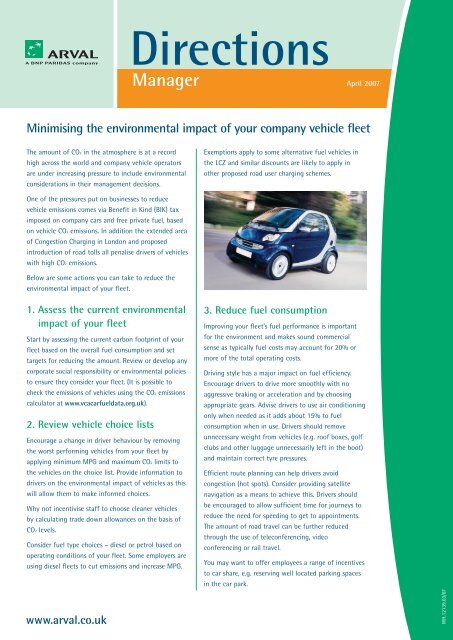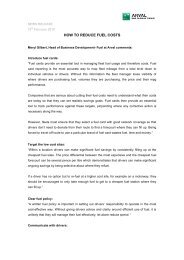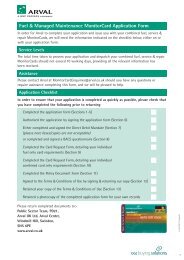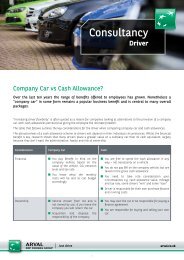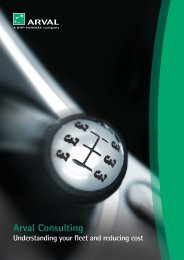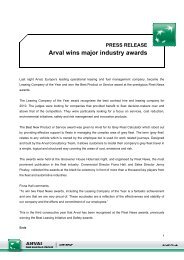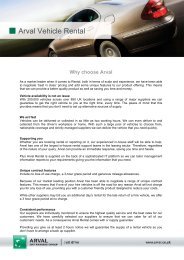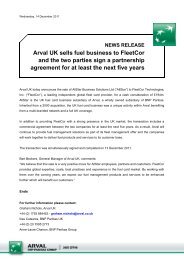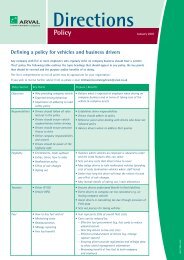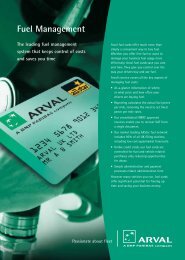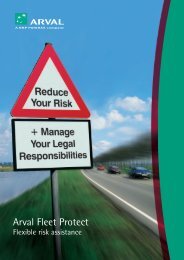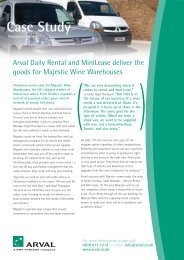Environmental impact of your vehicles - Arval
Environmental impact of your vehicles - Arval
Environmental impact of your vehicles - Arval
You also want an ePaper? Increase the reach of your titles
YUMPU automatically turns print PDFs into web optimized ePapers that Google loves.
Directions<br />
Manager April 2007<br />
Minimising the environmental <strong>impact</strong> <strong>of</strong> <strong>your</strong> company vehicle fleet<br />
The amount <strong>of</strong> CO2 in the atmosphere is at a record<br />
high across the world and company vehicle operators<br />
are under increasing pressure to include environmental<br />
considerations in their management decisions.<br />
One <strong>of</strong> the pressures put on businesses to reduce<br />
vehicle emissions comes via Benefit in Kind (BIK) tax<br />
imposed on company cars and free private fuel, based<br />
on vehicle CO2 emissions. In addition the extended area<br />
<strong>of</strong> Congestion Charging in London and proposed<br />
introduction <strong>of</strong> road tolls all penalise drivers <strong>of</strong> <strong>vehicles</strong><br />
with high CO2 emissions.<br />
Below are some actions you can take to reduce the<br />
environmental <strong>impact</strong> <strong>of</strong> <strong>your</strong> fleet.<br />
1. Assess the current environmental<br />
<strong>impact</strong> <strong>of</strong> <strong>your</strong> fleet<br />
Start by assessing the current carbon footprint <strong>of</strong> <strong>your</strong><br />
fleet based on the overall fuel consumption and set<br />
targets for reducing the amount. Review or develop any<br />
corporate social responsibility or environmental policies<br />
to ensure they consider <strong>your</strong> fleet. (It is possible to<br />
check the emissions <strong>of</strong> <strong>vehicles</strong> using the CO2 emissions<br />
calculator at www.vcacarfueldata.org.uk).<br />
2. Review vehicle choice lists<br />
Encourage a change in driver behaviour by removing<br />
the worst performing <strong>vehicles</strong> from <strong>your</strong> fleet by<br />
applying minimum MPG and maximum CO2 limits to<br />
the <strong>vehicles</strong> on the choice list. Provide information to<br />
drivers on the environmental <strong>impact</strong> <strong>of</strong> <strong>vehicles</strong> as this<br />
will allow them to make informed choices.<br />
Why not incentivise staff to choose cleaner <strong>vehicles</strong><br />
by calculating trade down allowances on the basis <strong>of</strong><br />
CO2 levels.<br />
Consider fuel type choices – diesel or petrol based on<br />
operating conditions <strong>of</strong> <strong>your</strong> fleet. Some employers are<br />
using diesel fleets to cut emissions and increase MPG.<br />
Exemptions apply to some alternative fuel <strong>vehicles</strong> in<br />
the LCZ and similar discounts are likely to apply in<br />
other proposed road user charging schemes.<br />
3. Reduce fuel consumption<br />
Improving <strong>your</strong> fleet’s fuel performance is important<br />
for the environment and makes sound commercial<br />
sense as typically fuel costs may account for 20% or<br />
more <strong>of</strong> the total operating costs.<br />
Driving style has a major <strong>impact</strong> on fuel efficiency.<br />
Encourage drivers to drive more smoothly with no<br />
aggressive braking or acceleration and by choosing<br />
appropriate gears. Advise drivers to use air conditioning<br />
only when needed as it adds about 15% to fuel<br />
consumption when in use. Drivers should remove<br />
unnecessary weight from <strong>vehicles</strong> (e.g. ro<strong>of</strong> boxes, golf<br />
clubs and other luggage unnecessarily left in the boot)<br />
and maintain correct tyre pressures.<br />
Efficient route planning can help drivers avoid<br />
congestion (hot spots). Consider providing satellite<br />
navigation as a means to achieve this. Drivers should<br />
be encouraged to allow sufficient time for journeys to<br />
reduce the need for speeding to get to appointments.<br />
The amount <strong>of</strong> road travel can be further reduced<br />
through the use <strong>of</strong> teleconferencing, video<br />
conferencing or rail travel.<br />
You may want to <strong>of</strong>fer employees a range <strong>of</strong> incentives<br />
to car share, e.g. reserving well located parking spaces<br />
in the car park.<br />
www.arval.co.uk WH.12139.03/07
<strong>Arval</strong> fuel cards can help to reduce route deviation as<br />
they are accepted at the largest network <strong>of</strong> fuel<br />
stations in the UK including low cost supermarkets. The<br />
<strong>Arval</strong> reporting system will highlight the fuel<br />
expenditure <strong>of</strong> all <strong>your</strong> fleet drivers.<br />
4. Maintain <strong>your</strong> <strong>vehicles</strong><br />
Ensuring <strong>vehicles</strong> are properly maintained has financial,<br />
health and safety and environmental benefits including<br />
reducing fuel consumption and emission levels.<br />
Regular maintenance and vehicle checks have a<br />
positive influence on fuel use and a well-maintained<br />
engine can improve fuel economy, so manufacturer’s<br />
recommendations on servicing should be followed. The<br />
wrong tyre pressure could reduce tyre life by<br />
approximately 25% and potentially increase fuel<br />
consumption by up to 2.5%.<br />
5. Reduce accidents<br />
Improving employees’ driving techniques can reduce<br />
accidents, maintenance costs such as tyre and brake<br />
wear and vehicle damage recharges. Repairing <strong>vehicles</strong><br />
after accidents causes waste, both financially and<br />
environmentally from spare parts, oil, and workshop<br />
resources.<br />
All accidents should be investigated and reviewed with<br />
drivers and driver training should be implemented<br />
where appropriate. Your fleet policy should include a<br />
target for the reduction <strong>of</strong> accidents.<br />
www.arval.co.uk<br />
6. Review cash allowances<br />
Government research shows that drivers opting out <strong>of</strong><br />
company cars typically move to a vehicle with 20g/km<br />
worse CO2 performance. Review the options you <strong>of</strong>fer<br />
for cash allowances and incentivise the choice <strong>of</strong><br />
efficient <strong>vehicles</strong> through ECOS / PCP schemes with<br />
discounts for better performing <strong>vehicles</strong> or increase /<br />
decrease allowances based on vehicle choice (using CO2<br />
emissions and MPG performance as benchmarks).<br />
7. Monitor performance and<br />
market development<br />
Improving the environmental performance <strong>of</strong> <strong>your</strong> fleet<br />
should reduce <strong>your</strong> costs. Monitor savings, measure<br />
fuel consumption, carbon reduction and accident rate<br />
improvements. Benchmark drivers against key<br />
performance indicators such as mpg, tyre wear and<br />
licence points.<br />
Successful cost reductions should be publicised to<br />
employees, shareholders and as general PR stories and<br />
drivers should be awarded for demonstrating cost<br />
savings or good practice.<br />
Although it is preferential to reduce the amount <strong>of</strong><br />
carbon emissions, <strong>your</strong> company may want to<br />
additionally investigate carbon-trading options.<br />
Emissions can be <strong>of</strong>fset through investment into<br />
forestation, alternative energy projects or other carbon<br />
reduction projects.<br />
Keep a close watch on technological advances in<br />
<strong>vehicles</strong> such as improved engine efficiency, alternative<br />
fuel development and new vehicle design.<br />
Any updates to <strong>your</strong> fleet policy designed to improve<br />
<strong>your</strong> environmental <strong>impact</strong> should be communicated to<br />
drivers and you should gain signed acceptance <strong>of</strong> new<br />
policy from them where applicable.<br />
The advantages <strong>of</strong> making <strong>your</strong> fleet greener could be<br />
reduced vehicle and fuel costs, increased productivity<br />
and improved company image. Your drivers benefit<br />
from reduced driving hours, and safer driving<br />
techniques and the benefits to the environment are<br />
reduced traffic levels and emissions and safer roads.


